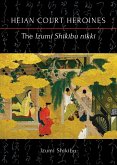Murasaki Shikibu's The Tale of Genji, written in Japan in the early eleventh century, is acknowledged to be one of Japan's greatest literary achievements, and sometimes thought of as the world's first novel. It is also one of the earliest major works to be written by a woman. This introduction to the Genji sketches the cultural background, offers detailed analysis of the text, discusses matters of language and style and ends by tracing the history of its reception through nine centuries of cultural change. This book will be useful for survey courses in Japanese and World Literature. Because The Tale of Genji is so long, it is often not possible for students to read it in its entirety and this book will therefore be used not only as an introduction, but also as a guide through the difficult and convoluted plot.
Table of contents:
Preface; Genji chapter titles; Genealogical chart; Part I. The Cultural Background: 1. Politics; 2. Murasaki Shikibu; 3. Religion; 4. Language; 5. A grammar of sexual relations; 6. History and fiction; Part II. The Tale of Genji: 7. Sexual politics (chapters 1-12); 8. Penance and restitution (chapters 12-21); 9. A prospect of flowers (chapters 22-33); 10. Dangerous obsessions (chapters 34-41); 11. A passion for self-destruction (chapters 42-54); Part III. Language and style: 12. The narrator's presence; 13. Kashiwagi's tortured mind; 14. Equivocal narration; 15. Poetry in prose; 16. Translations; Part IV. Impact, Influence and Reception: 17. Early textual history; 18. Murasaki in hell; 19. Medieval commentaries; 20. Tokugawa readings; 21. Modern readings; Guide to further reading.
Murasaki Shikibu's The Tale of Genji, written in Japan in the early eleventh century, is acknowledged to be one of Japan's greatest literary achievements, and sometimes thought of as the world's first novel. This book will be useful for survey courses in Japanese and World Literature.
This introduction to The Tale of Genji sketches the text's cultural background and offers an analysis of the text's language.
Hinweis: Dieser Artikel kann nur an eine deutsche Lieferadresse ausgeliefert werden.
Table of contents:
Preface; Genji chapter titles; Genealogical chart; Part I. The Cultural Background: 1. Politics; 2. Murasaki Shikibu; 3. Religion; 4. Language; 5. A grammar of sexual relations; 6. History and fiction; Part II. The Tale of Genji: 7. Sexual politics (chapters 1-12); 8. Penance and restitution (chapters 12-21); 9. A prospect of flowers (chapters 22-33); 10. Dangerous obsessions (chapters 34-41); 11. A passion for self-destruction (chapters 42-54); Part III. Language and style: 12. The narrator's presence; 13. Kashiwagi's tortured mind; 14. Equivocal narration; 15. Poetry in prose; 16. Translations; Part IV. Impact, Influence and Reception: 17. Early textual history; 18. Murasaki in hell; 19. Medieval commentaries; 20. Tokugawa readings; 21. Modern readings; Guide to further reading.
Murasaki Shikibu's The Tale of Genji, written in Japan in the early eleventh century, is acknowledged to be one of Japan's greatest literary achievements, and sometimes thought of as the world's first novel. This book will be useful for survey courses in Japanese and World Literature.
This introduction to The Tale of Genji sketches the text's cultural background and offers an analysis of the text's language.
Hinweis: Dieser Artikel kann nur an eine deutsche Lieferadresse ausgeliefert werden.








